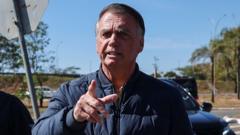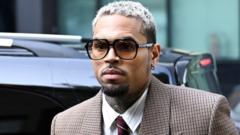In a significant legal development, Jair Bolsonaro, the former president of Brazil, has been ordered by a court to wear an ankle monitoring device and adhere to a curfew due to ongoing fears that he might flee the country while facing serious charges related to an alleged coup against President Luiz Inacio Lula da Silva following the latter's electoral victory in 2021. Bolsonaro, who served as Brazil's president from 2019 to 2022, stands accused of orchestrating plans to prevent Lula from taking office in January 2023, allegations he vehemently denies, labeling the accusations as unfounded.
Court Enforces Ankle Tag and Curfew on Bolsonaro Amidst Coup Trial

Court Enforces Ankle Tag and Curfew on Bolsonaro Amidst Coup Trial
Brazil's former president faces strict surveillance as he stands trial for alleged coup plotting against Luiz Inacio Lula da Silva.
The Supreme Court's decision is rooted in concerns surrounding Bolsonaro's potential to evade justice, prompting judicial measures that include surveillance and restrictions on his communication. Judge Alexandre de Moraes mandated that Bolsonaro be placed under continuous monitoring and prohibited from using social media or contacting certain individuals, including his son, Eduardo Bolsonaro, who has been active in lobbying for his father in the U.S. These restrictions have been justified by claims that both Bolsonaro and his son were involved in attempts to influence public officers through illegal means.
The political landscape has further complicated the situation. Following President Biden's tariff threats aimed at Brazilian goods, which were connected to Bolsonaro's legal troubles, Lula retaliated by warning of equivalent retaliation should these tariffs be imposed. The former president faces serious implications if convicted, including potential decades in prison, as he is one of eight individuals charged with five offenses including attempted coup and involvement in an armed criminal organization.
Investigations into the events surrounding the January 8, 2023, riots, during which Bolsonaro supporters stormed government buildings amid his refusal to accept electoral defeat, have produced claims that he played a leading role in organizing a criminal effort to undermine Brazil's democratic framework. As this complex political drama unfolds, the eyes of both Brazil and the international community remain fixed on the courtroom.
Accusations of political persecution permeate Bolsonaro's defense; he asserts that the charges against him are politically motivated, designed to undermine his potential candidacy in 2026. As the judicial proceedings progress, the former president continues to maintain that he never conspired for a coup, echoing sentiments of wrongful prosecution and political victimization.
Thus, as Bolsonaro faces trial in an increasingly polarized environment, the implications of these legal proceedings stretch beyond personal consequences, touching upon broader questions of democracy, rule of law, and international diplomatic relations.
The political landscape has further complicated the situation. Following President Biden's tariff threats aimed at Brazilian goods, which were connected to Bolsonaro's legal troubles, Lula retaliated by warning of equivalent retaliation should these tariffs be imposed. The former president faces serious implications if convicted, including potential decades in prison, as he is one of eight individuals charged with five offenses including attempted coup and involvement in an armed criminal organization.
Investigations into the events surrounding the January 8, 2023, riots, during which Bolsonaro supporters stormed government buildings amid his refusal to accept electoral defeat, have produced claims that he played a leading role in organizing a criminal effort to undermine Brazil's democratic framework. As this complex political drama unfolds, the eyes of both Brazil and the international community remain fixed on the courtroom.
Accusations of political persecution permeate Bolsonaro's defense; he asserts that the charges against him are politically motivated, designed to undermine his potential candidacy in 2026. As the judicial proceedings progress, the former president continues to maintain that he never conspired for a coup, echoing sentiments of wrongful prosecution and political victimization.
Thus, as Bolsonaro faces trial in an increasingly polarized environment, the implications of these legal proceedings stretch beyond personal consequences, touching upon broader questions of democracy, rule of law, and international diplomatic relations.





















